#anatolian turkish
Text
211: Erkin Koray // Arap Saçı
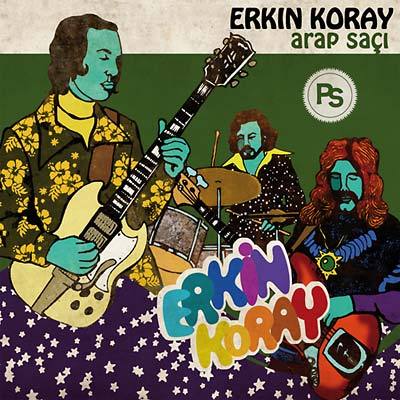
Arap Saçı
Erkin Koray
2021, Pharaway Sounds
Pharaway Sounds’ Arap Saçı (Arab Hair) collects 24 Erkin Koray tracks originally issued as singles between 1968 and 1976. Koray is best known in the West for his groundbreaking fusion of Anatolian/Arabic folk and classical with crunching psychedelic rock on his 1974 debut LP Elektronik Türküler. However, as Angela Sawyer’s tart liner notes observe, Turkey was predominantly a singles market at the time, and back home Koray did most of his damage on 7”. The limitations of the format, and the preferences of Koray’s record company, preclude the kind of long-form acid voyages he undertook on Elektronik Türküler, but he's able to generate plenty of smoke on these “pop” singles.
Highlights abound. Arap Saçı kicks off with 1973’s “Mesafaler” (“Distances”), a scorching psych banger complete with cowbell that only stops rocking to periodically gawp and stare fixedly into space for 20 or 30 seconds at a time before shaking itself awake to get back to business. (Is there footage of a Turkish TV performance featuring liquid light art? You bet your hairy ass there is.)
youtube
The waltzing, organ and hand drum-led “Komşu Kızı” (“Girl Nextdoor”) is a classic melancholy Middle Eastern ballad that hides a wild, surprising drop two-thirds of the way through; Koray freaks “Aşka İnanmıyorum” (“I Do Not Believe in Love”) with his insinuating croon and serpentine guitar licks; “Istemem” (“I Do Not Want”) mixes a light-stepping folk beat with some stinging solos that aren’t too far off what Uli Jon Roth would get up to in Germany with Scorpions a few years later. There really isn’t a bum track to be found.
This new compilation covers much of the same ground as the ‘70s Erkin Koray (AKA Mesafaler) and Erkin Koray 2 (AKA Şaşkın) singles compilations, and Pharaway Sounds opts to follow their track sequencing as closely as possible—a good choice, as they had a great flow, though a bit frustrating for those hoping to track Koray’s musical development chronologically. Regardless, we know that Koray was exposed to Western music as a young age, learning Occidental classical music on the piano as a child and discovering rock ‘n’ roll as a teen. According to the liners, Koray was performing songs by Elvis, Fats Domino, and Jerry Lee Lewis in the late ‘50s, and by the late ‘60s, when he began to emerge as a recording artist, he’d clearly imbibed industrial quantities of Hendrix, Cream, and the other usual psychonauts.
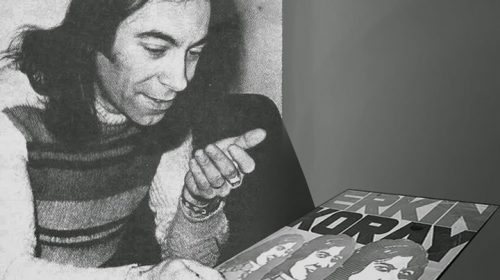
In a previous review, I briefly contrasted Koray with Egypt’s Omar Khorshid, a fellow guitar god and contemporary pioneer in electrified Arabic music. Khorshid had some familiarity with Western pop music, but he was working with the top stars in Arab folk and classical, using electric instruments to push traditional Eastern music forward rather than to fuse it with rock. Koray on the other hand was a long-haired freak who claims to have fought in the streets with a knife and joined Anglo-American-inspired combos with names like Mustard (Hardal) and Sweat (Ter). By the late ‘60s rock had become popular in Turkey, as had Arabesk music, which Sawyer describes as “a purposely uncouth… appropriation of Arabic pop and folk, popular with rural or marginalized folks who were suddenly encountering pockets of urbanized Europe in their backyard.” Koray intuitively crossbred the invasive genre (rock) with the reactionary one (Arabesk) and found himself one of the fathers of a powerful new mongrel breed of psych music.
youtube
By reissuing both Elektronik Türküler and these essential singles, Pharaway Sounds has done a real service to psych and non-Western rock aficionados. Koray makes a great gateway to the other masters of ‘70s Anatolian folk-rock, including Selda, Moğollar, and Barış Manço, a loose affiliation of artists that has been one of my most prized discoveries of recent years.
211/365
#erkin koray#turkish music#turkish rock#turkish psych#anatolian rock#anatolian psych#anatolian music#psych rock#heavy psych#psychedelia#'70s music#'60s music#pharaway sounds#music review#vinyl record#arab hair
7 notes
·
View notes
Text
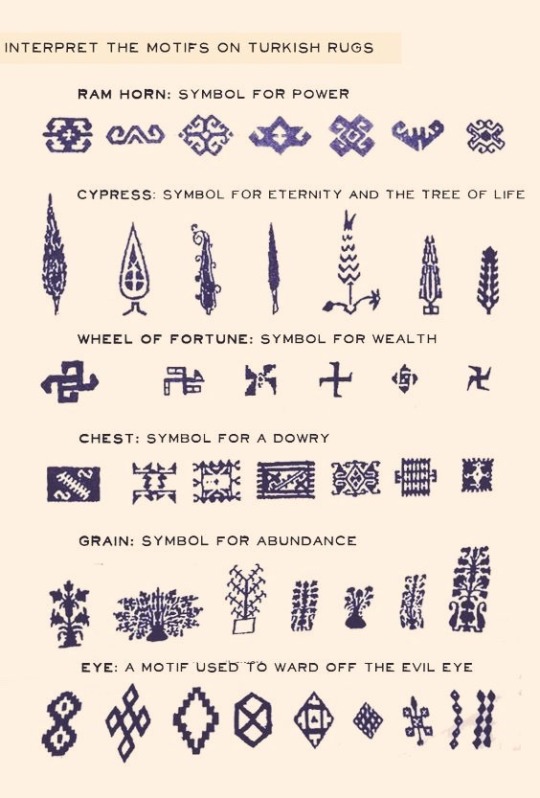
🪬
#turkic#turkic culture#turkish#anatolia#middle asia#culture#turkish rugs nz#alıntı#art#aesthetic#sanat#kilim#anatolian#anatolian turks#blue
19 notes
·
View notes
Text
The whole universe is full... / Yunus Emre
The whole universe is full of God
yet His truth is seen by no one
you have to look for Him in yourself
you and he are not separate you are one
The other world is what can't be seen
here on earth we must live as well as we can
exile is grieving and anguish
no one comes back who has once gone
Come let us be friends this one time
let life be our friend
let us be lovers of each other
the earth will be left to no one
You know what Yunus is saying
its meaning is in the ear of your heart
we should all live truly here
for we will not live here forever
(13th century, translated from the Turkish by W.S. Merwin & Talat Sait Halman)
#poetry#Yunus Emre#Turkish poetry#Sufi poetry#W.S. Merwin#Talat Sait Halman#Sufism#God#poems of praise#loving the world anyway#love#exile#the beautiful earth#friendship#mysticism#Anatolian poetry
3 notes
·
View notes
Text

Turkish woman, Turkish Republic, 1930.
5 notes
·
View notes
Text

Selda - Türkülerimiz 2
The Middle East and Anatolia will always have a special place in my heart, and amongst all the special things and people from the region, the music, specifically, is always something special. And from all the music out of the regions that I love, Selda has to be one of my all time favorites. If you're not familiar with music from Turkey or the Middle East, then this is a wonderful place to start. Heartfelt and beautiful.
1 note
·
View note
Text
it’s insane that most of our elders know more languages than us ??? and like without actually going to school or anything
#like my grandfather speaks kurdish turkish and one of the circassian languages but i’m not sure which one#and maybe he knows little armenian too?#really insane#just anatolian people things#txt
6 notes
·
View notes
Photo

A commissioned memorial portrait of their Anatolian Shepherd named Mack who sadly passed away early in life. Polychromos and Luminance colored pencils used on 14″X17″ Strathmore paper.
#anatolian shepherd#turkish shepherd dog#livestock guardian dogs#livestock dog#guardian dog#working breed#Working dog#service dog#dog#canine#pets#animal#pet portrait#commission#Dog Art#dog drawing#Dog portrait#Pet Memorial
4 notes
·
View notes
Text
Beautiful Colorful Handmade Kilim
#vintage#anatolian carpet#handmade carpet#decorative handmade rug#living room carpet#bedroom carpet#bohemian carpet#carpet#turkish handmade kilim
0 notes
Text
organizing my computer to these absolute IMMACULATE VIBES
youtube
#music#youtube video#youtube music#Youtube#anatolian rock always rules#anatolian-> psicodelic turkish rock genre
0 notes
Text
youtube
Erkin Koray - Çöpçüler (Live @ Jolly Joker Ankara, 2013)
0 notes
Text
28: Selda // Vurulduk Ey Halkim Unutma Bizi

Vurulduk Ey Halkim Unutma Bizi
Selda
1976, Türküola
The western thirst for vintage psych rock is unquenchable, which has led to a ton of great reissues in the past decade from far-flung psychedelic hotbeds like Zambia, Japan, and Turkey—the latter home of the great Selda Bağcan. Selda’s ‘70s folk rock recordings are as galvanizing as any punk, by turns as warlike and ecstatic as the leftist poetry and Islamic scales that give life to the songs. 1976’s Vurulduk Ey Halkim Unutma Bizi (We Were Shot, My People, Don’t Let Us Forget) isn’t as fuzz-drenched as the self-titled LP that proceeded it earlier in the same year, but it is equally fiery.
I’ve always found that folk music from around the Mediterranean Sea has a swashbuckling quality, the interplay of string players like two perfectly matched fencers thrusting and parrying atop a long dining table. The crossed guitar and baglama illustrated on Vurulduk Ey Halkim Unutma Bizi’s back cover comes across as a statement of purpose. It’s music that gets the blood pumping, for dance or protest alike, and Selda matches it vocally. She’s the heartfelt call to the snaky electric baglama and organ’s response on “Karaoglan”; the frosty embodiment of a woman finally pushed to close a door forever on “Bundan Sonra”; the mountain wind on the forlorn “Maden Dagi.”
youtube
It’s not surprising that Turkey’s far right authorities found Selda’s music threatening enough to harass her for most of the following decade—it’s heady stuff even without the help of intelligible words. Online translation butchers the lyrics included on the sleeve, yet the imagery in the fragments is powerful:
We bled, we became soil,
We withdrew, we became a flag,
We became leaves, we came to this day
We made the bread abundant,
We made the pain honey. (from “Aciyi Bal Eyledik” [“We Turned the Pain Into Honey”])
In “Bundan Sonra” (“After This”), describing some unknown, unforgiveable betrayal:
Quran, Bible, if you were a psalm
I would not open you from now on,
If you were the juice of the river of paradise
I would not drink you from now on.
[…]
Is my death your wish?
Your word has worked for me—
If you were heaven’s line
I wouldn’t cross you from now on.
Imagery of Lorca-esque purity:
They burned their last cigarette like a lamp in their mouths
They lit their last cigarette
They lit their last cigarette like a lamp in their mouths
And they sat
Under the dry-leaved cannon tree. (from “Maden Iscileri” [“Miners”])
As with Victor Jara and other politically militant bards of the South American nueva cancion movement, it’s possible to have a rich and fulfilling experience with Selda’s music on its purely sonic merits. But for me anyway, understanding its connections to movements for the rights of working people deepens my appreciation. Vurulduk Ey Halkim Unutma Bizi is a great one.
youtube
28/365
#Selda#selda bağcan#pharaway sounds#turkish music#anatolian rock#'70s#vinyl records#music review#'70s music
2 notes
·
View notes
Text
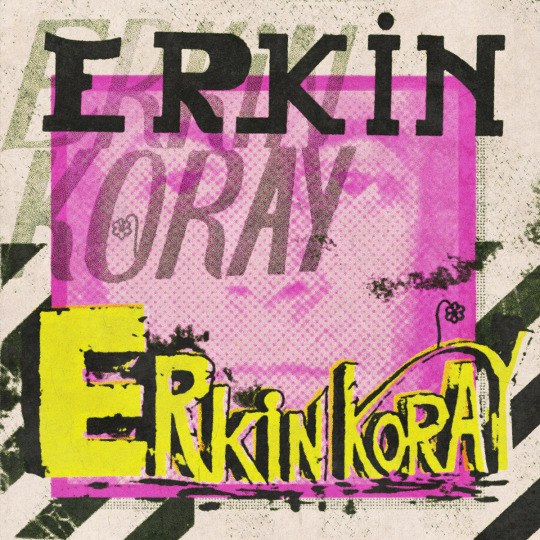
Mustafa Erkin Koray
24 June 1941 – 7 August 2023
A pioneering figure in Turkish Psych and “Father of Turkish Rock,” Koray blended traditional Turkish melodies with Western Rock elements in bands as early as the 50s. His first solo single ‘Anma Arkadaş’ was released in 1967 followed by a self-titled album in 1973. His 1974 album ‘Elektronik Türküler’ is considered a groundbreaking work, fusing Anatolian Folk music with Psychedelic Rock.
0 notes
Text
How Salur Kazan was Taken Prisoner and How Uruz Freed Him
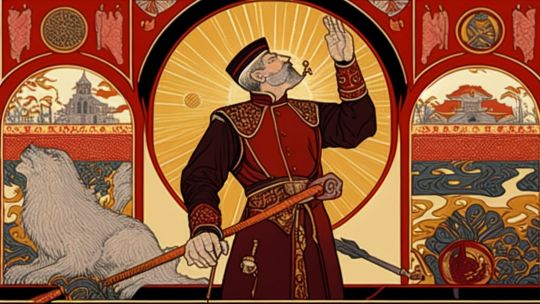
View On WordPress
#Anatolian Seljuks#Central Asian literature#cultural heritage#Epic tales#Heroes and legends#Medieval era#Oral tradition#Salur Kazan#Turkish folklore#Uruz
0 notes
Text
youtube
Ибо, где двое или трое собраны во имя Моё,
там Я среди них.
Евангелие от Матфея 18:20
#Music of The Turkish Sufism#Musical Heritage of the Dervishes#Muslim Mysticism#Turkish Musical Traditions#Alevism#Anatolian Alevism#Qizilbashism
0 notes
Text
instagram
#home decor#home design#homegrown#homestuck#homedesign#home solutions forev#homecoming#home & lifestyle#oriental rugs#contemporary rugs#wool rugs#persian rugs#braided rugs#vintage#anatolian#red carpet#carpetdesign#doormat#turkey#turkish#turkish rug#rug#antique#antique rug#19th century#prayer rug#tumblr shop#interior#home#flooring
0 notes